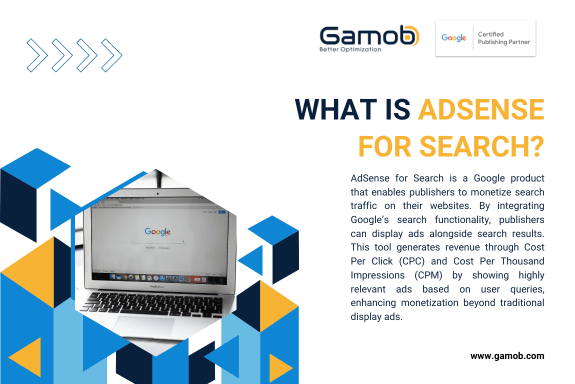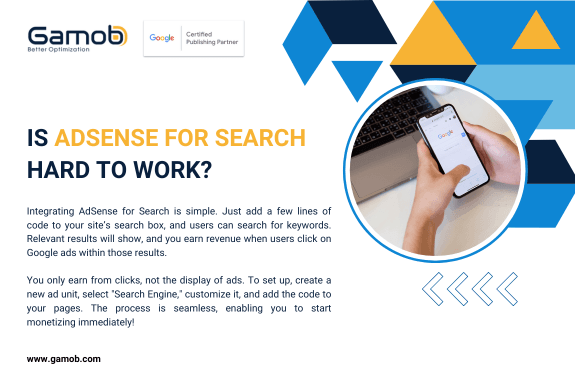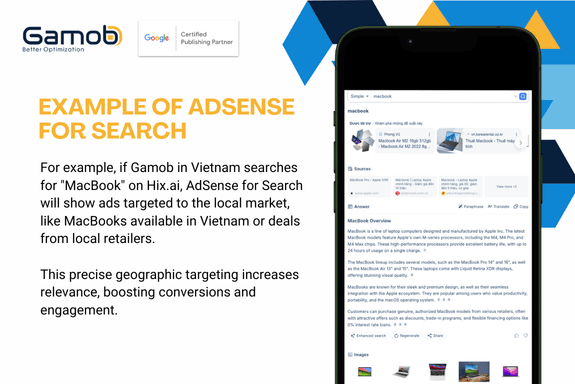
Subscribe to receive the latest blog posts to your inbox every week.
By subscribing you agree to with our Privacy Policy.
As a website publisher, you’re always looking for ways to maximize your monetization efforts and increase revenue. One tool that’s often overlooked, but has the potential to greatly enhance your earnings, is AdSense for Search. If you own a website with a search engine, understanding how AdSense for Search works can significantly impact your income.
In this post, we’ll explore what AdSense for Search is, how it works, and why it’s a game-changer for publishers, with the potential to double or even triple your revenue. Let’s dive in!
The meaning of Adsense for search
AdSense for Search is a Google product designed specifically for publishers who own websites with a built-in search function. With AdSense for Search, publishers can integrate Google search functionality into their site and display Google ads alongside search results.
This tool allows publishers to monetize the search traffic on their websites, generating revenue from both Cost Per Click (CPC) and Cost Per Thousand Impressions (CPM) on the ads shown in the search results. Instead of relying solely on display ads placed within your content, AdSense for Search targets users who are actively searching for information on your site, presenting them with highly relevant ads based on their queries.

Is adsense for search hard to work?
The answer is no. As a publisher, integrating AdSense for Search into your site is quick and easy with just a few lines of code. Once added, users can search for specific keywords through your search box, and relevant search results will be displayed. If a user clicks on one of Google’s ads within those results, you earn revenue through AdSense.
It’s important to note that publishers only earn from clicks on the search results, not from the mere display of results—so each click brings in potential revenue.
Setting up a search engine ad unit in AdSense is a breeze. Simply create a new ad unit, select the “Search Engine” option, give it a unique name, customize your settings to match your site’s design, and add the generated code to your pages. The entire process is seamless, allowing you to start monetizing your search traffic right away!

Deep understanding from Gamob’s example
The image above demonstrates the powerful targeting capabilities offered by AdSense for Search, which includes keyword targeting, geographic targeting, and demographic targeting. These advanced features ensure that the ads displayed in response to user searches are highly relevant, improving both user experience and ad performance. Let’s explore how each of these targeting methods works and enhances the effectiveness of AdSense for Search.
Keyword-Based Targeting
One of the most fundamental ways AdSense for Search delivers targeted ads is through keyword targeting. For example, if Gamob searches for the term "Marketing" on the Tinhte website, AdSense for Search displays ads related to marketing products or services alongside the search results. This means that the ads are directly relevant to the user’s search query, ensuring they are more likely to be engaged with. Since the ads align with the user’s immediate intent, it significantly increases the likelihood of clicks, driving more revenue for the publisher.
Geographic Targeting
Another key feature of AdSense for Search is geographic targeting, which tailors ads to the user’s location. For instance, if you are currently browsing the Tinhte website from Vietnam and search for the keyword "marketing," the ads shown will be specifically tailored to the Vietnamese market. This ensures that users see ads that are not only relevant to their search query but also to their geographic location, making the ads more pertinent and likely to resonate with local users. Whether the user is in a major city or a remote area, geographic targeting makes the ads more relevant to the audience's needs and preferences.
Demographic Targeting
In addition to keyword and geographic targeting, AdSense for Search can also use demographic targeting to serve ads based on the age, gender, or other demographic characteristics of the user. This allows advertisers to fine-tune their campaigns and ensure that the ads are reaching the right segments of the audience. For example, if a user’s demographic profile suggests they are a young professional in marketing, the ads shown will be tailored to that demographic, such as ads for marketing courses, tools, or software that appeal specifically to young professionals in the industry.
How This All Comes Together
By combining these three forms of targeting—keyword, geographic, and demographic—AdSense for Search ensures that the ads you display on your site are not only relevant to what users are searching for but also aligned with where they are located and who they are. This holistic targeting approach leads to better engagement with ads, higher click-through rates (CTR), and ultimately more revenue for publishers. It allows you to deliver a more personalized experience, catering to the specific needs and interests of each user, based on their search behavior, location, and demographic profile.

Key Policies to Follow When Using AdSense for Search
As you set up AdSense for Search on your website, it's crucial to follow Google's policies to ensure compliance and maintain a positive user experience. Here are some of the most important guidelines you need to keep in mind:
- Limit on AdSense for Search Boxes
Publishers are allowed to place only two AdSense for Search boxes per page. This ensures that the search functionality remains clean and user-friendly, without overcrowding the page with too many ads. - No Modifications to the Code
It’s essential to leave the code untouched. Publishers cannot modify the generated AdSense for Search code in any way. This ensures the ads display correctly and function as intended, maintaining the integrity of the ad system. - Code Usage Restrictions
The search code should only be placed on search results pages. This means that the search box and accompanying ads should only appear where users are actively searching for content, ensuring that ads are shown in the right context. - No Click Incentivization
Just like with other AdSense ads, publishers must not incentivize users to click on the ads. Offering rewards or using misleading language to encourage clicks violates Google’s policies and can result in penalties or account suspension.
By adhering to these policies, you can ensure that your AdSense for Search setup remains compliant and effective, delivering a seamless experience for both you and your users.
How to earn money from Adsense for search
The amount of revenue you can generate from AdSense for Search (AFS) is influenced by several important factors. Here's a simplified overview of these factors how to earn money from AFS:
- Traffic Volume
The more visitors your site attracts, the greater the potential for ad clicks. Higher traffic means more search opportunities and, ultimately, more chances to earn. - Click-Through Rate (CTR)
The relevance of ads to search queries determines the CTR. A higher CTR translates to more clicks and higher revenue. For example, with a 1% CTR and a $0.50 CPC, 2,000 clicks could bring in $1,000. - Cost Per Click (CPC)
CPC varies based on your site’s niche and the geographic location of your audience. Visitors from high-paying countries like the US or UK typically generate higher CPCs than those from regions with lower rates. - Estimated Revenue Example
For 200,000 monthly visitors, 1% CTR, and a $0.50 CPC, you could earn approximately $1,020 per month. This is based on 4,000 clicks (400,000 searches x 1% CTR) generating $2,000 in total revenue. - Long-Term Growth
With continuous traffic growth and optimization of content and ad placements, you can increase both CTR and CPC, leading to steady, long-term revenue growth.
By optimizing your traffic and ads, AdSense for Search can become a reliable, scalable income stream.
Instead of researching and deploying AFS for your website/app AI, you can choose Gamob as your AFS development partner. Gamob is Google Certified Publishing Partner (GCPP) that empowers over 10,000 publishers helping them deliver expert solutions in Product and User Acquisition Consultancy, Revenue & Inventory Optimization, and Inventory Quality Assurance. Our mission is to boost publishers' and ad networks' success, ensuring quality, efficiency, and sustainable growth through trusted, innovative partnerships.
---------------------
Gamob | GCPP - Empower your monetization journey
- Email: [email protected]
- Website: www.gamob.com
- Linkedin: www.linkedin.com/company/gamob-gcpp